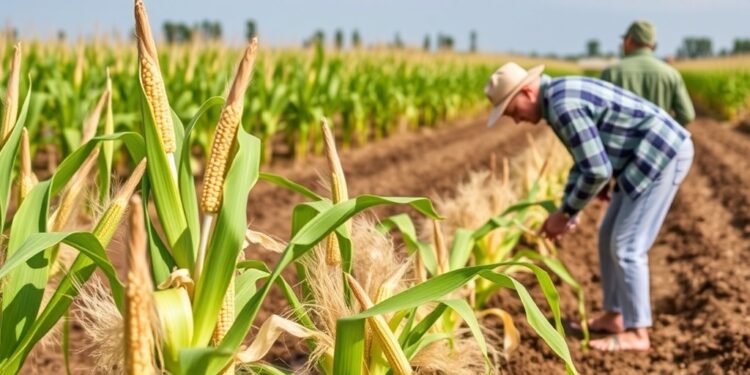The increasing adoption of genetically modified Bt maize has become a double-edged sword for farmers in the U.S. Corn Belt. While engineered to combat pests such as the notorious rootworms, extensive planting of these crops has inadvertently led to overutilization and the development of pest resistance, jeopardizing the future efficacy of this biotechnological solution. Recent research underscores the alarming economic consequences of this phenomenon, estimating a staggering $1.6 billion in losses for farmers – a direct result of suboptimal planting practices and the resulting efficiency loss in pest suppression. This situation has raised urgent questions about the sustainability of Bt crops and the systemic issues that contribute to their overuse.
The basis of this investigation rested upon an extensive compilation of 12 years’ worth of field trial data from various farms throughout ten states in the Corn Belt. Researchers, including lead author Ziwei Ye, utilized an interdisciplinary framework to discern between decision-making driven by individual farmer interests and those considering larger community dynamics. Their findings revealed a troubling trend: while the initial implementation of Bt maize offered a promising decline in pest populations, subsequent overreliance on the crop has ultimately compromised its ability to thwart rootworms effectively.
Analyzing the timeframe from 2014 to 2016, the study highlighted that farmers frequently exceeded ideal planting levels for Bt maize, particularly in areas with low pest pressure. This incongruity resulted in minimal advantages concerning pest suppression, coupled with escalated costs tied to purchasing transgenic seeds. Additionally, the researchers raised a critical point regarding the depletion of the pest susceptibility pool, a consequence of ill-informed planting decisions that have now culminated in an estimated economic fallout of $1.6 billion for growers situated primarily in eastern Corn Belt states.
Underlying this overutilization trend are broader systemic challenges, which necessitate urgent attention and innovation in agricultural practices. Misconceptions about the cost-benefit dynamics associated with Bt maize persist, fostering a landscape where farmers make decisions based on immediate self-interest without recognizing the long-term ramifications of those choices. This scenario has been exacerbated by the market motivations of seed companies, whose bundled trait packages create a muddled array of options for farmers, often obscuring the real implications of their selections.
The circumstances surrounding this dilemma echo the concept of the “tragedy of the commons,” where individual behaviors driven by short-term gains result in the overexploitation of shared resources. Consequently, the overplanting of Bt maize not only threatens the crop’s sustainability but also compromises the global food supply chain, with potential ripple effects reaching far beyond local farming communities. Herein lies the critical challenge for regulators: striking a balance between immediate economic incentives for farmers and the overarching goal of long-term agricultural and environmental sustainability.
In alignment with this view, experts suggest reinforcing the need for comprehensive farmer education about rootworm pressures and the ecological implications of pest management strategies involving Bt hybrids. The lack of awareness among farmers regarding the long-term consequences of their decisions represents a significant barrier to achieving sustainable agriculture practices. Close attention must also be paid to the agricultural policies that guide these practices, facilitating better decision-making processes at the grassroots level.
The urgent call for improved seed diversity, transparency, and informed farmer choices signifies a crucial pivot point for the future of biotech crops. The complexities surrounding insect resistance and the ever-evolving nature of pest management underscore the necessity for collaborative dialogue among stakeholders, including scientists, regulatory bodies, and farmers. Only through collective action and transparency can the agricultural community hope to sustain the benefits offered by transgenic technologies and mitigate inevitable resistance development.
Ultimately, embracing a paradigm shift in how Bt maize is utilized and managed requires not only technological advancements but also a reconceptualization of farmer incentives and educational approaches. The adaptation of pest management practices that prioritize sustainability is not just a necessity but an obligation to ensure agricultural resilience for generations to come. The ongoing dialogue surrounding these issues will shape the evolution of agricultural biotechnology, enabling growers to thrive in an increasingly complex agricultural landscape.
This exploration encourages farmers and researchers alike to remain vigilant and adaptive, learning from the past as they navigate an uncertain agricultural future. By addressing the multifaceted challenges presented by Bt maize overuse and pest resistance, we can foster an environment where innovation thrives and sustainable practices lead to a healthier agricultural system.
Subject of Research: Economic losses and pest resistance associated with overplanting of Bt maize in the U.S. Corn Belt.
Article Title: Too much of a good thing: lessons from compromised rootworm Bt maize in the US Corn Belt.
News Publication Date: 28-Feb-2025.
Web References: 10.1126/science.adm7634.
References: Available upon published article.
Image Credits: None provided.
Keywords: Bt maize, pest resistance, agriculture, genetically modified crops, U.S. Corn Belt, economic losses, pest management.
Tags: agricultural biotechnology challengesBacillus thuringiensis insecticidal proteinsCorn Belt farming practiceseconomic losses from crop overuseenvironmental implications of GMO cropsimpact of Bt maize cultivationlong-term effects of Bt maizemanaging pest resistance in agriculturepest resistance development in agriculturepest suppression efficiency lossrootworm-resistant maizesustainability of genetically modified crops





